|
|
|
Sort Order |
|
|
|
Items / Page
|
|
|
|
|
|
|
| Srl | Item |
| 1 |
ID:
175168


|
|
|
|
|
| Summary/Abstract |
This article probes the promises and anomalies of a new universalism proposed by Dipesh Chakrabarty as an apparent retort to the challenge of the Anthropocene. Revising established understandings of temporality and human agency imagined within modernity, the new universalism depicts a radically different horizon shaped by interconnections produced by the subsumption of human history into natural history. A key element of Chakrabarty’s new universalism is his dramatic repudiation of the reputed postcolonial claim of difference which hurriedly dissolves the afterlife and persistence of coloniality on a global scale in favour of a yet-to-be-forged planetary consciousness. Chakrabarty’s new universalism raises profound questions for rethinking International Relations (IR). However, without due cognisance of sedimented difference, Chakrabarty ends up reciting the secular-liberal story of one-world universalism. It is argued here that a differentiated universalism organised around the notion of human finitude can simultaneously attend to postcolonial concerns and the challenge of the Anthropocene.
|
|
|
|
|
|
|
|
|
|
|
|
|
|
|
|
| 2 |
ID:
180801
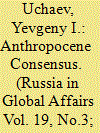

|
|
|
|
|
| Summary/Abstract |
Humanity is facing the highest risk of global existential catastrophe in its
history. What should be done to ensure effective international cooperation
for the sustainable survival of humankind? The article posits that the main
obstacles to international cooperation lie in the field of ideas and mentality.
To overcome these obstacles, a new unifying metanarrative is proposed,
the Anthropocene consensus. It means taking human survival not just as
a goal or interest, but as an ethical Absolute, which serves as a reference
point for assessing all other value systems. Since different forms of social
organization, including at the international level, are unequal in terms
of their impact on the prospects for human survival, the Anthropocene
consensus implies certain principles of the global socio-political order: a
non-absolute nature of sovereignty, a dialogue of countries with different
political regimes, justice, and the priority of global security over national
security. The conclusion suggests that the Anthropocene consensus has a
reasonable chance of theoretical and practical success.
|
|
|
|
|
|
|
|
|
|
|
|
|
|
|
|
| 3 |
ID:
157594


|
|
|
|
|
| Summary/Abstract |
This article is a collective response to ‘Planet Politics’ by Anthony Burke et al., which was published in this journal in 2016, and billed as a ‘Manifesto from the End of IR’. We dispute this claim on the basis that rather than breaking from the discipline, the Manifesto provides a problematic global governance agenda which is dangerously authoritarian and deeply depoliticising. We substantiate this analysis in the claim that Burke et al. reproduce an already failed and discredited liberal cosmopolitan framework through the advocacy of managerialism rather than transformation; the top-down coercive approach of international law; and use of abstract modernist political categories. In the closing sections of the article, we discuss the possibility of different approaches, which, taking the Anthropocene as both an epistemological and ontological break with modernist assumptions, could take us beyond IR’s disciplinary confines.
|
|
|
|
|
|
|
|
|
|
|
|
|
|
|
|
| 4 |
ID:
183507


|
|
|
|
|
| Summary/Abstract |
Australian IR scholars and scholarship have been prominent in framing, informing and contributing to global debates in the field of global environmental politics. This article reviews and analyses those contributions with a focus on the period since 2009. It takes as a starting point research that addresses international or global environmental issues, including those that demand a scalar approach to how the global is voiced and experienced at local and regional sites, and that, in doing so, illuminates key disciplinary concerns and contributes to disciplinary debates. The core of the article is woven around three overlapping sub-fields: global environmental governance, international political economy, and normative IR. It reveals how Australian-based IR scholars working on the environment have engaged with critiques of neo-liberalism, pursued more critical approaches to securitization, expanded the empirical and conceptual basis of how we understand institutional ecosystems, contributed to bringing social justice concerns to the forefront of global environmental politics and theory, and been part of a conversation about environmental challenges in the Asia Pacific region. The article concludes with some thoughts about the future direction of this research and scholarship.
|
|
|
|
|
|
|
|
|
|
|
|
|
|
|
|
| 5 |
ID:
193468


|
|
|
|
|
| Summary/Abstract |
China is the largest contributor to global greening trends over the past two decades, pursuing large-scale tree planting and revegetation initiatives. This type of ecological engineering is controversial, given concerns about China’s authoritarian environmentalism. This essay examines such Chinese efforts and how they diverge from Western environmental approaches based on nature preservation. Chinese environmentalism is based on a tradition that does not delineate nature from culture, the natural from the engineered. This distinction has consequences for global environmental governance in the Anthropocene as China promotes its approach to the global South.
|
|
|
|
|
|
|
|
|
|
|
|
|
|
|
|
| 6 |
ID:
173819
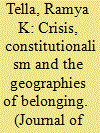

|
|
|
|
|
| Summary/Abstract |
The Anthropocene – as a geological and cultural epoch – brings with it new modes of articulating environmental crisis and citizenship for peoples in India. This essay illustrates how space, scale and identity can be located within contemporary climate political imaginations through the normative canvas of the Indian Constitution. It argues that by thinking about climate change as a collection of dualisms – past/present, near/faraway, futures/futurelessness – Indian vocabularies of constitutionalism can inform authoritative understandings of crisis and citizenship. The article makes use of empirical material collected between 2016–17 for the author's doctoral research. It argues that Indian climate change elites characterize crisis in distinctive ways that draw attention to the symbolic and material implications of interrogating the shifting geographies of belonging in India. It shows how they make use of a framework of constitutionalism that is simultaneously attentive to the semantics of both planetary and subaltern thinking in the Anthropocene.
|
|
|
|
|
|
|
|
|
|
|
|
|
|
|
|
| 7 |
ID:
170227
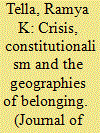

|
|
|
|
|
| Summary/Abstract |
The Anthropocene – as a geological and cultural epoch – brings with it new modes of articulating environmental crisis and citizenship for peoples in India. This essay illustrates how space, scale and identity can be located within contemporary climate political imaginations through the normative canvas of the Indian Constitution. It argues that by thinking about climate change as a collection of dualisms – past/present, near/faraway, futures/futurelessness – Indian vocabularies of constitutionalism can inform authoritative understandings of crisis and citizenship. The article makes use of empirical material collected between 2016–17 for the author's doctoral research. It argues that Indian climate change elites characterize crisis in distinctive ways that draw attention to the symbolic and material implications of interrogating the shifting geographies of belonging in India. It shows how they make use of a framework of constitutionalism that is simultaneously attentive to the semantics of both planetary and subaltern thinking in the Anthropocene.
|
|
|
|
|
|
|
|
|
|
|
|
|
|
|
|
| 8 |
ID:
145983


|
|
|
|
|
| Summary/Abstract |
The concept of the Anthropocene – the geological epoch defined by human action – has so far remained largely absent from International Relations (IR) analyses. This is perplexing given the monumental stakes involved in dealing with planetary change and the discipline’s overriding focus on crisis. This silence may exist, however, because contemporary studies of international relations are troubled by the Anthropocene, which shifts basic assumptions about how humans live in the midst of perpetual danger, harm, and risk. It also presents us with the prospect of failure in existential terms, if indeed we are living in (and causing) ‘the sixth mass extinction’. The focus of this article, therefore, is threefold. First, to consider the challenges to environmental IR that the Anthropocene concept presents; second, to probe what it means for IR to respond to the end of nature; and third, what is required of IR to deal with the prospect of mass extinction. It is argued that Earth system changes wrought by human action require the discipline to demystify its own ontological, epistemological, and ethical approaches that are culpable in ushering in the Anthropocene. Doing so may allow IR to provide necessary insight into the contemporary and historical effects of the state system as an enabler of planetary change, and the future possibilities for global politics within the Anthropocene.
|
|
|
|
|
|
|
|
|
|
|
|
|
|
|
|
| 9 |
ID:
162266


|
|
|
|
|
| Summary/Abstract |
The human control of fire is a relatively neglected part of the discussion of the contemporary transformation of the planet. Thinking about it in terms of geopolitics is a way to link climate adaptation, extinction and the possibilities of extending traditional analyses of political ecology to the global scale. Such thinking is explicitly rejected as the appropriate premises for foreign policy action by the Trump administration which poses American greatness in terms of traditional understandings of firepower. This clash of geopolitical cultures is now key to global politics, where dramatic landscape transformation, related species extinctions as well as climate change results directly and indirectly from human control of combustion. Firepower is a matter of military technology as well as, in the form of fossil fuel combustion, the essential energy source that fuels the global economy. Focusing on combustion as a key geophysical force in contemporary geopolitics offers useful insights into the Anthropocene discussion and, in particular, the two planetary boundaries of climate change and biodiversity loss, which are key to contemporary efforts at global environmental governance.
|
|
|
|
|
|
|
|
|
|
|
|
|
|
|
|
| 10 |
ID:
159795


|
|
|
|
|
| Summary/Abstract |
Michel Foucault’s concept of governmentality is widely used throughout the social sciences to analyse the state, liberalism, and individual subjectivity. Surprisingly, what remains ignored are the repeated claims made by Foucault throughout his seminal Security, Territory, Population lectures (2007) that governmentality depends more fundamentally on a specific form of time, than on the state or the subject. By paying closer attention to Foucault’s comments on political temporality, this article reveals that governmentality emerged from, and depends upon, a very specific cosmological order that experiences time as indefinite: what Foucault calls our modern ‘indefinite governmentality’. This is elaborated here in three ways. First, by reviewing the transformation from a linear Christian cosmology to our modern indefinite governmentality through what Foucault calls the ‘de-governmentalization of the cosmos’. Second, by arguing that our experience of indefinite temporality was concretised by the geological discovery of ‘deep time’. Third, by engaging a contemporary geological concept that returns humanity to its lost cosmological centrality, thereby re-governing the cosmos: the Anthropocene, or the ‘human epoch’. Analysed using indefinite governmentality, Foucault’s forewarning of an ‘end of history’ is implicit in the new concept of the Anthropocene’s origins and ends. If it is the paradigm shift its proponents claim, then it threatens to end the temporality of the state, the subject, and governmentality itself.
|
|
|
|
|
|
|
|
|
|
|
|
|
|
|
|
| 11 |
ID:
189883
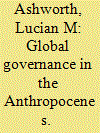

|
|
|
|
|
| Summary/Abstract |
This article adumbrates how we can re-envision global governance in the Anthropocene. The first section explores the plurality of Anthropocenes through an initial analysis of the Great Transformation since 1950. The second section focuses on what this means for global governance through insights from the history of international thought. The first insight comes from earlier works by the international functionalists, who emphasized process over goals. The second is found in the international political geography of Derwent Whittlesey, who outlined how we could take in ecological concerns through a four-dimensional view of the industrial world. Here I will also stress the growing importance of the concept of waste and refuse in global governance, a concern that becomes visible when we think about global politics in four dimensions. The final concluding section underscores how a messy and unprecedented crisis requires an equally messy and unprecedented approach to global governance.
|
|
|
|
|
|
|
|
|
|
|
|
|
|
|
|
| 12 |
ID:
141637
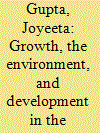

|
|
|
|
|
| Summary/Abstract |
Unlike the developed world, which is locked into its production-, consumption-, and infrastructure-intensive lifestyles, the developing countries still have multiple options.
|
|
|
|
|
|
|
|
|
|
|
|
|
|
|
|
| 13 |
ID:
168867
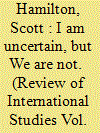

|
|
|
|
|
| Summary/Abstract |
The concept of ‘the Anthropocene’ as a new human-induced geological epoch has made its way into IR. Debates have recently arisen between ‘post-humanists’ stressing its destruction of subject-object binaries and ‘New Anthropocentrists’ arguing that it increases the importance of the human being as planetary steward. This article moves beyond these debates to question a strange but unexplored foundation that underlies the basic discourse of the Anthropocene: the assertion that humanity must be grouped together as a collective species, ‘anthropos’, or planetary ‘We’. Using the philosophy of Martin Heidegger, it argues that the Anthropocene reveals a new and deeper shift in human subjectivity, moving from an individualistic Cartesian ‘I’ to a collective and planetary ‘We’. This argument is made in three steps. First, today's common treatment of humanity as a collective whole in Anthropocene literature is examined. Second, it details how transformations in subjectivity occur by shifting the historical boundaries of our most fundamental notion of certainty – the ‘subiectum’ – and how the technologies of Earth System Science (ESS) subtly facilitate this shift today. Finally, the article argues how this subjective transformation from the ‘I’ to the ‘We’ results from the temporal, spatial, and existential incalculability and uncertainty of the Anthropocene, thereby fostering the rise of certainty in new forms of conflictual identity politics.
|
|
|
|
|
|
|
|
|
|
|
|
|
|
|
|
| 14 |
ID:
139823


|
|
|
|
|
| Summary/Abstract |
Water is an essential building block of the Earth system and a nonsubstitutable resource upon which humankind must depend. But a growing body of evidence shows that freshwater faces a pandemic array of challenges. Today we can observe a globally significant but collectively unorganized approach to addressing them. Under modern water management schemes, impairment accumulates with increasing wealth but is then remedied by costly, after-the-fact technological investments. This strategy of treating symptoms rather than underlying causes is practiced widely across rich countries but leaves poor nations and many of the world's freshwater life-forms at risk. The seeds of this modern “impair-then-repair” mentality for water management were planted long ago, yet the wisdom of our “water traditions” may be ill-suited to an increasingly crowded planet. Focusing on rivers, which collectively satisfy the bulk of the world's freshwater needs, this essay explores the past, present, and possible future of human-water interactions. We conclude by presenting the impair-then-repair paradigm as a testable, global-scale hypothesis with the aim of stimulating not only systematic study of the impairment process but also the search for innovative solutions. Such an endeavor must unite and cobalance perspectives from the natural sciences and the humanities.
|
|
|
|
|
|
|
|
|
|
|
|
|
|
|
|
| 15 |
ID:
192660
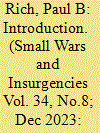

|
|
|
|
|
| Summary/Abstract |
This special issue contains five papers dealing with various aspects of climate change and its relationship to patterns of insurgency and terrorism. This is the first special issue in this journal on a topic that increasingly dominates the media and wider political discussion, though SWI has published some papers previously in this area, most notably one by Marina Malamud in 2018 that usefully categorised climate-change conflicts into four types: 1) those linked to the environment into resource-based conflict; 2) a warfare ecology paradigm referring to non-premeditated change to the environment as a result of military conflict; 3) warfare in which the environment was the target and 4) an insurgency-conflict intersection in which climate change increased the likelihood and frequency of war and conflict.Footnote1 These four categories have helped inform the approach taken in this introduction, especially the last relating to the probable impact of global climate change on insurgencies.
|
|
|
|
|
|
|
|
|
|
|
|
|
|
|
|
| 16 |
ID:
179325
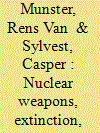

|
|
|
|
|
| Summary/Abstract |
In the Anthropocene, International Relations must confront the possibility of anthropogenic extinction. Recent, insightful attempts to advance new vocabularies of planet politics tend to demote the profound historical and intellectual links between our current predicament and the nuclear age. In contrast, we argue that it is vital to revisit the nuclear-environment nexus of the Cold War to trace genealogies of today's intricate constellation of security problems. We do so by reappraising the work of Jonathan Schell (1943–2014), author of The Fate of the Earth (1982), who came to regard extinction as a defining feature of the nuclear age. We show how a deep engagement with nuclear weapons led Schell to an understanding of the Earth as a complex, delicate ecology and fed into a sophisticated, Arendtian theory of extinction. Despite its limitations and tensions, we argue that Schell's work remains deeply relevant for rethinking human–Earth relations and confronting the Anthropocene.
|
|
|
|
|
|
|
|
|
|
|
|
|
|
|
|
| 17 |
ID:
178185


|
|
|
|
|
| Summary/Abstract |
The article analyzes the Svalbard Global Seed Vault (SGSV) as a specific security technology created to deal with the ecological threat of biodiversity loss. Built in 2008 inside the Arctic Circle, the SGSV serves as a backup for 1,700 agricultural gene banks around the world. If seed collections are lost due to natural disasters or human error, the gene banks can request copies of their varieties from Svalbard and restore their collections to continue the endeavour of plant breeding. The article focuses on the particular temporal politics expressed in the SGSV. Drawing on Niklas Luhmann’s reflections on time, it is argued that the SGSV opens up the possibility of reversing events by expanding the duration of the present. By separating seeds from their ecological connections on the one hand and controlling their metabolic processes through the use of cold on the other, an enduring temporal zone is created that allows modern society to control the unpredictable and irreversible dynamics of life and undo its emergent effects. The SGSV therefore materializes what is herein called the politics of reversibility.
|
|
|
|
|
|
|
|
|
|
|
|
|
|
|
|
| 18 |
ID:
184429


|
|
|
|
|
| Summary/Abstract |
The emerging and vibrant field of environmental humanities to date has not received considerable attention in Central Asia. In light of the Anthropocene crises, there is a real urgency for maturing this field and investigating the methodological and epistemological challenges that environmental topics demand, often working across disciplinary habits and time scales. This roundtable brings together Central Asianists from a range of backgrounds to discuss the sources and scales of their investigation, their challenges and potential. The contributors discuss how particular kinds of sources such as climate models, archival manuscripts, ethnographic fieldwork and media analyses have been used to understand environmental changes in the region. In what ways do the traditions of scholars’ disciplinary training guide the scale of analysis? Looking toward the future of environmental humanities in Central Asia, this roundtable suggests paths for developing this vital field of enquiry.
|
|
|
|
|
|
|
|
|
|
|
|
|
|
|
|
| 19 |
ID:
152405
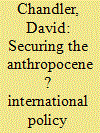

|
|
|
|
|
| Summary/Abstract |
This article analyses security discourses that are beginning to self-consciously take on board the shift towards the Anthropocene. It first sets out the developing episteme of the Anthropocene, highlighting the limits of instrumentalist cause-and-effect approaches to security, which are increasingly becoming displaced by discursive framings of securing as a process generated through new forms of mediation and agency and capable of grasping interrelations in a fluid context. This approach is the methodology of hacking: creatively composing and repurposing already existing forms of agency. It elaborates on hacking as a set of experimental practices and imaginaries of securing the Anthropocene, using as a case study the field of digital policy activism with a focus on community empowerment through social-technical assemblages being developed and applied in ‘the City of the Anthropocene’: Jakarta, Indonesia. The article concludes that policy interventions today cannot readily be grasped in modernist frameworks of ‘problem solving’ but should be seen more in terms of evolving and adaptive ‘life hacks’.
|
|
|
|
|
|
|
|
|
|
|
|
|
|
|
|
| 20 |
ID:
171157
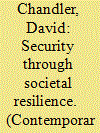

|
|
|
|
|
| Summary/Abstract |
The concept of societal resilience has rapidly spread throughout the policy world, driven by the desire to use systems theories and process understandings to develop new security approaches for coping, bouncing-back, and adaptive improvement in the face of shocks and disturbances. However, this article argues that under the auspices of the Anthropocene, the assumptions and goals of societal resilience become problematic. This is because external interventions often ignore feedback effects, meaning that attempts to resolve problems through focusing upon enabling and capacity-building can be seen as counterproductive “fire-fighting” rather than tackling causation. Even more “alternative” or “community-based” approaches, relying upon interventions to enable so-called “natural” processes, either through an emphasis on local and traditional knowledge or new monitoring technologies, constitute problems for resilience advocacy: firstly, the problem of unrecognized exploitation; and secondly, the problem of continuing to sacrifice others to maintain unsustainable Western modes of consumption and production.
|
|
|
|
|
|
|
|
|
|
|
|
|
|
|
|
|
|
|
|
|